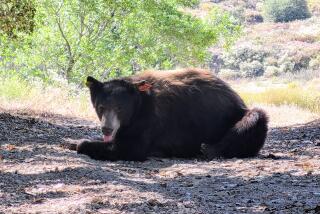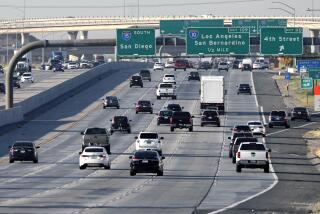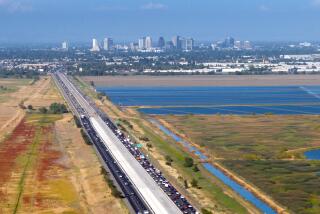He’s Got a Beef --and a Pig and a Chicken
- Share via
It’s bad enough that beleaguered Southern California motorists must tolerate jackknifed big rigs, police pursuits and slow-moving tourists in barge-sized RVs. Now a reader suggests an even more repulsive nuisance plaguing our freeways.
Brian Persson, a Los Angeles-area contractor, wrote to Behind the Wheel to complain that he often finds himself stuck in traffic behind hulking big rigs packed with livestock. And the stuff that flies out of these rigs doesn’t exactly smell like baby’s breath, he said.
Persson asks what rules govern truckers who let that foul discharge loose all over the freeways.
Question: “I wonder how many illnesses (be they temporary or worse) result from these trucks.”
Answer: Granted, animal waste can be offensive to the olfactory nerves, but health officials say there is little chance of contracting an illness--such as E. coli--from flying freeway dung.
“You can never say never, but I’m unaware of any cases of transmission that way,” said the Los Angeles County public health director, Jonathan Fielding, who couldn’t help laughing at the question.
The state Vehicle Code prohibits truck drivers from spilling material onto the freeway. The only two things permitted to fall from trucks are clear water and feathers from live birds.
But a California Highway Patrol officer, Greg Williams, said the CHP can’t be expected to cite every trucker hauling a cow that forgot to go before it left.
“These animals are not potty-trained,” said Williams, who patrols the Bakersfield area. “If you want a steak tonight, someone has to haul the cattle by truck.”
*
Earlier this year, California earned the dubious distinction of being named the state with the nation’s worst roads. Even Arkansas boasts smoother thoroughfares, according to a study by Transportation California, a coalition of road builders, labor unions, and asphalt and pavement suppliers.
Burt Shapiro of Hollywood believes the work crews that dig up streets to make underground repairs are partly to blame for the sorry condition of local roads.
Q: “Why can’t all construction workers who cut into the street be required to repair the street to at least the same quality it was before their work?”
A: Believe it or not, Burt, work crews are required to do just that. At least that’s the policy in the city of Los Angeles, according to Robert Bowen, assistant director of the city’s Bureau of Contract Administration. Bowen’s department oversees the private contractors and utility companies that tear up city streets to make repairs.
When one of these crews repairs a street, it embeds a metal tag in the asphalt to identify the company or utility that did the work. If someone complains about shoddy roadwork, city inspectors use those tags to identify the responsible party and order fixes.
*
Tom Kendall of Calabasas wrote to say he had been cited for speeding in southern Utah. He was caught zipping along at 93 mph in a 75-mph zone. No doubt Tom was trying to get back to sunny California at the time and he just couldn’t help the heavy foot.
Now Kendall wants to know if that ticket will tarnish his driving record in California.
Q: “I’d like to know if Utah routinely turns over traffic violations records to the California DMV. If it does not, then that is the end of my concern in this matter.”
A: Sorry, Tom, but traffic violations that occur in most states will haunt you wherever you go in the country until the fine is paid. Most states are members of the Driver License Compact, an agreement between states to share such information.
Even Utah, the state that boasts an onion as its official vegetable, participates in the compact. And, yes, your insurance company has access to that information.
If you would like to attend traffic school to wipe the ticket from your record, you must check with the authorities in Utah to see what, if any, schools they will let you attend in California. Each court handles such matters differently.
*
Rodney Fayton of the San Fernando Valley wrote to say that he has long wondered how the state decides which destinations are emblazoned on freeway signs.
Q: “Why do so many northbound freeway interchange signs around Los Angeles say Sacramento? Granted Interstate 5 goes there, but aren’t there closer places, such as San Fernando Valley or Santa Clarita, that would be more useful?”
A: For this question, the traffic wonks at the California Department of Transportation cited the state Traffic Manual, a document the size of the Old Testament that regulates the size, color, height, width and placement of every freeway sign.
The manual says freeway signs should include the names of “distant major destinations (control cities) for long trip orientation.” In addition, those “distant major destinations” should remain consistent throughout the freeway route, according to the manual.
*
A previous Behind the Wheel column discussing the rules of carpooling failed to mention that motorcycles and clean-air vehicles in California are permitted to use the diamond lanes, regardless of how many passengers are on board.
In the case of clean-air vehicles--electric or natural gas-powered cars--state lawmakers offered the exemption as an incentive to get more motorists to drive clean, green, commuting machines.
Federal transportation officials say motorcycles are permitted in carpool lanes because it is safer to keep two-wheeled vehicles moving than to have them travel in stop-and-go traffic.
Several motorcycle riders wrote to complain that most motorists don’t realize that in California motorcycles are also permitted to “lane split,” or to ride in between cars. They say drivers often curse, make obscene gestures or crowd motorcyclists who practice this maneuver.
Motorcyclist Julie Dobyns, who described herself as a law-abiding driver of a 1997 Ducati, suggested the animosity comes from motorists who “dislike the fact that someone is moving through traffic when they are not.”
Or perhaps it comes from motorists who dislike being stuck in traffic near trucks loaded with reeking livestock.
*
If you have questions, gripes or story ideas related to driving or traffic in Southern California, write to Behind The Wheel, 202 W. 1st Street, Los Angeles, CA 90012, or send an e-mail to behindthe wheel@latimes.com.
More to Read
Sign up for Essential California
The most important California stories and recommendations in your inbox every morning.
You may occasionally receive promotional content from the Los Angeles Times.














